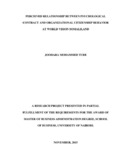| dc.description.abstract | In an environment of rapid organizational change, where the ideas of satisfaction and motivation are potentially meaningless, the psychological contract appears to provide a useful integrative concept around which to cover the concerns of the contemporary workplace. There exist a positive relationship between the Psychological Contract (PC) and Organizational Citizenship Behavior (OCB). This implies that if employees feel that their expectations are being met, they are motivated to engage in extra activities outside their job description. On the other hand, violation of the Psychological Contract can result into adverse effects. Investigations have shown that when violation does perceptually occur, it influences negatively positive work attitudes and behaviors. The objective of the research was to examine the perceived relationship between psychological contract and Organizational citizenship behavior at the World Vision Somaliland staff. The study adopted both cross sectional descriptive design; data was collected in one point in time, since it involved collection of data from the entire staff thus vacillating comparison and concrete conclusions arrived at. The data was collected by use of questionnaire that was administered by drop and pick method. However, the method was supplemented by email to those staff that was in the fields or even that was on leave. The data was sorted and coded accordingly to allow more appropriate analysis to be carried out. The data was analyzed using procedures within Statistical Package for Social Sciences (SPSS). The type of data was quantitative and descriptive statistics. Descriptive statistics such as mean, standard deviations, percentages and frequency distributions were used to generate meaning from the data in relation to the research objective. The study further found out that World Vision Somaliland was concerned for staff long-term well-being; WV helped them to develop externally marketable skills; a job only as long as the employer needs them; World Vision Somaliland makes no commitments to retain the staff in the future and employees could count on wages and benefits. The study concluded that supervisor fairness leads to employee citizenship because a social exchange relationship develops between employees and their supervisors. The study further concluded that psychological contracts afford employees a sense of control and security in their relationship with employers, while providing employers a way to manage and direct employee behavior without heavy handed surveillance. A regression analysis showed that PC is positively related to OCB. This is in line with Mac-Neil, (1985) who asserted that when properly implemented, PC will create organizational harmony which in turn will improve organizational citizenship behavior. The study recommends that World Vision Somaliland should be concerned for staff long-term well-being by helping them to develop externally marketable skills which are needed by the employer. The study also recommends that the WV Somaliland should offer equal opportunities for training and development of staff for their upward mobility and self-improvement so that the employees can be able to the organization’s set goals. The study further recommends that the staff should turn in budgets, sales projections, expense reports, etc. in good time and keep up with developments in WV Somaliland and should feel comfortable with the nature of job responsibilities. | en_US |

